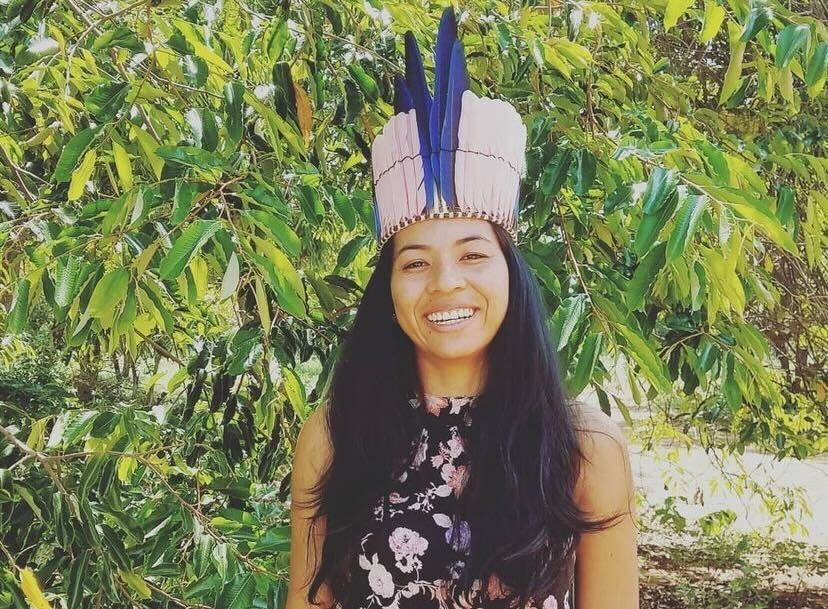Interview: memories and struggles of the Ãwa people
Kamutaja tells the story of her tribe, which had forced contact with non-indigenous people in 1973 and continues to fight for their rights
 Imagem: Arquivo pessoal
Imagem: Arquivo pessoal
Telling stories is about imparting knowledge and moments. There are contexts in which the act of telling stories has an important meaning: drawing on the past to express the struggle in the present. This is what Kamutaja Silva Ãwa does in her essay “In memory of Tutawa”, published in the 31st issue of the Sur Journal.
Kamutaja is a student of Pedagogy at UFT (Federal University of Tocantins) and president of Apãwa (Association of the Ãwa People), also in the state of Tocantins. In her essay, she portrays the struggle of the Ãwa people, also known as Avá-Canoeiro, from the 18th century to the present day, and the pursuit of justice and rights over their territory. Kamutaja was one of the four grantees of the 31st issue of Sur Journal. Speaking to Conectas, she outlines some of the points made in her essay.
Read the interview:
Conectas: In the introduction to the essay, you ask the question “how can the Ãwa people escape invisibility given the historical atrocities and the denial of their rights which have prevailed for over 40 years?” What conclusions did you come to in the text?
Kamutaja – In 1973, when the forced contact occurred, my people began to live under the representation of another people. So, our representation in the State, as a people, did not exist.
Over the course of my essay, I explain that we began the demarcation process and by starting this process we were able to analyze the injustices committed by the State – and this is where our visibility begins. And also when we make use of social networks, such as Instagram. The blog that I mention in the article is something else we have used to raise our visibility.
Conectas: What was the process like of reclaiming the Ãwa people’s land?
Kamutaja – The process began with a study by the anthropologist Patrícia de Mendonça and the environmentalist Luciana Ferraz to identify the lands of the Javaé people. They both requested and emphasized the importance of the Avá-Canoeiro people also being part of the study, since it was an area used by both groups.
That’s when they decided to listen to us and so my grandfather and my mother, who were survivors of the forced contact of ’73, decided to tell the truth about the story that was told by non-indigenous people and to reclaim the indigenous land that was really ours alone, belonging only to the Avá-Canoeiro people. Then they created a specific Working Group for our people and had to convince Funai [National Indian Foundation] of our existence.
We officially set up our association because we realized the importance of our people having political representation through an association. We came to understand how the demarcation process actually takes place. The process of reclaiming our land represents, for us, a time in which we have united as a people and worked together so it doesn’t take too long, since it’s been nearly a decade since we’ve been reclaiming the territory.
And we have realized that what takes the longest in this process is the sluggishness of the representations of the State, because at no time in the demarcation process have we had Funai’s support for reclaiming the land.
Conectas: How can civil society organizations help advance the indigenous agenda?
Kamutaja – Ever since we started this process, I have noticed that the indigenous movement has embraced this space occupied by civil society organizations to ensure that our rights are upheld. For example, through Conectas I could publish an article that tells the history of my people, our struggle for our rights as human beings, our constitutional rights, our rights over the Earth.
We also have the support of CIMI (Indigenous Missionary Council) that is helping my Ãwa people and other indigenous peoples in Brazil. So, one of the ways in which civil society can help us is to continue what it is already doing. Exposing that the rights of indigenous peoples are being violated and that the role of the Brazilian State, of the justice system, is to ensure that our way of life is not violated. And also that we are not violated and we do not accept being violated.
Conectas: How have the Ãwa people coped with the Covid-19 pandemic?
Kamutaja – It was a very delicate situation because when the pandemic began we lived apart, in the Javaé and Carajás villages, so we did not have the autonomy to organize in a specific place, just the Avá-Canoeiro people. And for us not to be able to position ourselves as one people who limit our rules in these pandemic situations made things very difficult.
[We were] also very afraid of losing my mother, who is currently the only survivor of the forced contact of ’73. And so, in the pandemic, we realized that there were situations with regard to the land demarcation process that could have been expedited, in the sense of speeding up some points in the demarcation process.


